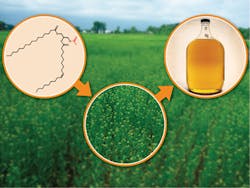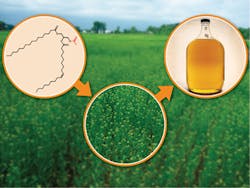Industrial Role for Oilseed Beckons
A genetically modified oilseed produces high yields of unusual triacylglycerols (TAGs) that may serve as biofuels or industrial feedstocks, report a team of researchers from Kansas State University, Manhattan, Kan., Michigan State University, East Lansing, Mich., and University of Nebraska – Lincoln, Lincoln, Neb. The nonfood crop can grow on poor quality farmland and requires little irrigation or fertilizer, they add. Oilseed grown in the field already has provided multi-liter quantities of the TAGs for tests.
Figure 1. Nonfood crop produces acetyl glyceride oils that may serve as biofuels and feedstocks. Source: Matt Wisniewski, GLBRC — copyright Plant Technology Journal.
The researchers modified Camelina sativa to produce levels of as much as 85 mol% acetyl-TAGs in the seed oil. The acetyl-TAGs boast lower viscosity and better cold-temperature characteristics than conventional TAGs, making them more suitable for biofuel and feedstock use, say the researchers. More details appear in articles in the journal Industrial Crops and Products and Plant Biotechnology Journal.
“We are currently focusing on fuel replacement, mostly because this was one of the initial goals of the funded project. At this point we are still quantifying key physical properties relevant for biofuels (pour point, cetane number, etc.),” notes Timothy Durrett, one of the researchers and an assistant professor in the Department of Biochemistry and Molecular Biophysics at Kansas State. “The viscosity of acetyl-TAGS is currently within the range of the requirements for Diesel No. 4; we are currently working on a biotechnology-focused approach to lower this viscosity further, potentially to that of Diesel No. 2,” he says.
“However, we are excited about other applications, particularly as plasticizers and lubricants, and look forward to testing these applications once we have more acetyl-TAGS available,” notes Durrett.
The researchers consider product testing a high priority; efforts are underway and likely will be ongoing, he says. They also are working to increase the percentage of acetyl-TAGs in Camelina seed; yields of as high as 95% may be possible via metabolic engineering, Durrett believes. In addition, the team hopes to develop methods to purify acetyl-TAGS from the remainder of the oil, and to incorporate other unusual fatty acids into the molecule, he notes.
A key challenge is obtaining pure acetyl-TAGS — either by finding a reasonable separation method or by increasing the acetyl-TAG content in the oil, says Durrett. “…Insights derived from product testing will be very helpful in telling us what level of purity we need, which might affect the priority of this challenge,” he explains. “Ideally we would be able to develop a seed oil that could directly replace current products and therefore offer a cost savings with regard to downstream processing.”
“I am working with a company called Winnowgen, which specializes in the commercialization of technology developed in academic labs. We have been contacted by different chemical and energy firms interested in utilizing acetyl-TAGS,” Durrett says.
Ramping up production shouldn’t be a problem, he notes. “We already have high acetyl-TAG yielding Camelina lines that grow well in the field. Commercial concerns (i.e., we need to find a market) and regulatory approval probably represent the biggest hurdles now.”

